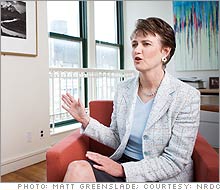The wizards of ozoneThe Natural Resources Defense Council has morphed from a small law firm into one of the country's most powerful players in corporate America's efforts to go green, writes Fortune's Corey Hajim.(Fortune Magazine) -- How do you know when environmentalism has really gone mainstream? When the leaders of some of the nation's dirtiest industries -- auto, oil, power and coal -- start playing the green card. Take the oil industry. Giants like ConocoPhillips (Charts, Fortune 500), Shell and BP America (Charts) just did what was once unthinkable: they joined calls for federal legislation requiring reductions in greenhouse gas emissions.
David Hawkins, climate center director for the Natural Resources Defense Council, first noticed a change in corporate America's attitude toward the environment about two years ago. He attributes it to the intense pressures -- public, regulatory, and competitive -- on companies to go green. But credit for the new mindset also goes to the NRDC. Since its founding in 1970 by John Adams, the NRDC has evolved from what was essentially a small environmental law firm into one of the country's biggest advocates for new state, federal and foreign policies and laws aimed at weaning consumers worldwide off their oil dependence -- and combating global warming. "They are a tremendous influence" on the environmental movement, says Andrew Ruben, vice president of strategy and sustainability at Wal-Mart, which is working with the NRDC on a variety of eco-friendly initiatives. "The staff has an incredible knowledge base and they help us understand where the opportunities and better solutions exist." Today the NRDC has more than 1.3 million supporters, a nearly fourfold increase since 2000, and an annual budget of about $70 million, mostly derived from membership fees and private contributions. With 300 employees, the agency's reach is global: it recently opened an office in China, one of the world's largest emitters of greenhouse gases. Despite its size, the NRDC certainly has its planet-saving work cut out for it. The good news is, companies increasingly turn to the agency for advice on climate-friendly policies and the prospect of future regulation. Wal-Mart (Charts, Fortune 500), for instance, called on the NRDC for help developing corporate strategies like its own emissions goals as well as tactical issues like setting standards for suppliers. The big box retailer and the NRDC, for instance, developed specifications on energy efficiency in fluorescent light bulbs and television set-top boxes it plans to sell once broadcast signals go digital. "When Wal-Mart set a standard of what kind of environmental performance their manufacturing firms have to reach," says Frances Beinecke, NRDC's president, "that has an enormous ripple effect down the supply chain." The NRDC also played a critical role in the recent $45 billion buyout of TXU (Charts, Fortune 500), the Texas-based energy giant. The NRDC worked with Environmental Defense, another environmental advocacy group, and private equity buyers TPG and Kohlberg Kravis Roberts to build a groundbreaking set of environmental commitments that helped quell opposition to the deal. Ultimately, TXU's new owners agreed to construct just three of 11 coal plants originally planned, to not build in other states, and to support global warming legislation in Congress. Some environmentalists criticized the deal as too weak. But NRDC officials counter that it was a huge step forward. "[TXU] turned from a company that was militantly opposed to global warming legislation to a company that is supporting that," says Hawkins, noting that Texas companies often benefit from having one of the largest congressional delegations in the country. "And that is very important in terms of politics." With the NRDC's help, commercial real estate giant CB Richard Ellis recently announced plans to become carbon neutral by 2010 and said it would work on helping clients become more energy efficient. Similarly, the Academy of Motion Pictures Arts and Sciences, which hosts the Oscars, and the National Basketball Association approached the NRDC for ways to make their operations greener. True, they may not have the bottom-line impact that Wal-Mart has, but their visibility among consumers is wide. "It's a great opportunity to reach a broader group of the public than we reach normally," says Beinecke. "This is a way to have a major communications opportunity that we wouldn't have otherwise." The NRDC has also been talking with Wall Street banks in the hopes that when potential clients come asking for loans, that the banks consider carbon storage and capture plans as a factor in evaluating deals. "The rate of return on a plant is driven not just by what policies are today," explains Hawkins, "but on what policies are ten years from now." Hawkins says he's encouraged by the discussions, even if they haven't yet had an impact on deal negotiations. For all the signs of progress and their own success, NRDC officials know they've got a long way to go before climate-friendly business practices are the norm. While some companies and legislators are moving in the right direction, many are not. Hawkins likens the challenges ahead to an overflowing bathtub. "The costs of doing something about it are not just the costs of turning off the faucet," says Hawkins. "It's the cost of dealing with [all the water] that has accumulated in the bathtub." And everyone -- from consumers to corporations to governments -- needs to grab a bucket. |
Sponsors
|

